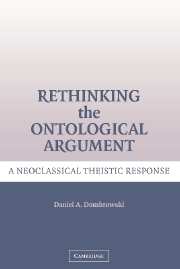Book contents
- Frontmatter
- Contents
- Acknowledgments
- Introduction
- 1 Historical Background
- 2 Poetry versus the Ontological Argument: Richard Rorty's Challenge
- 3 Deconstructionism and the Ontological Argument: The Case of Mark Taylor
- 4 Is the Ontological Argument Worthless? Graham Oppy's Rejection
- 5 Oppy, Perfect Islands, and Existence as a Predicate
- 6 Rival Concepts of God and the Ontological Argument: Thomas Morris, Katherin Rogers, and Alvin Plantinga
- Bibliography
- Index
3 - Deconstructionism and the Ontological Argument: The Case of Mark Taylor
Published online by Cambridge University Press: 16 July 2009
- Frontmatter
- Contents
- Acknowledgments
- Introduction
- 1 Historical Background
- 2 Poetry versus the Ontological Argument: Richard Rorty's Challenge
- 3 Deconstructionism and the Ontological Argument: The Case of Mark Taylor
- 4 Is the Ontological Argument Worthless? Graham Oppy's Rejection
- 5 Oppy, Perfect Islands, and Existence as a Predicate
- 6 Rival Concepts of God and the Ontological Argument: Thomas Morris, Katherin Rogers, and Alvin Plantinga
- Bibliography
- Index
Summary
The Viability of Philosophy
Let us start with a quotation from Mark Taylor:
Hegel brings to systematic completion insights anticipated by Plotinus and Augustine and subsequently articulated by Anselm. The entire Hegelian edifice can actually be understood as a sustained argument for God's existence. Anselm's faith seeking understanding becomes Hegel's translation of religious Vorstellungen into the philosophical Begriffe. Inasmuch as Hegel's system marks the closure of the ontotheological tradition, his philosophical rendering of the ontological argument is a pivotal moment in the fulfillment of the Western philosophical quest. If the ontological argument is in any way inadequate, ontotheology inevitably fails. Thus, philosophy's stake in the ontological argument is nothing less than the viability of philosophy itself.
(Taylor 1993, 11–12; 1982, 34–40)These remarkable lines were written in 1993 by Taylor, who is at present perhaps the most important deconstructionist philosopher of religion and theologian (or better, as he puts it, a/theologian). I say that these lines are “remarkable” despite the fact that no one, as far as I know, has yet remarked on them. Taylor has gone on to write more books and to say even more arresting things, but I think it may profit us to slow down the speed of Taylor's cinematic career so as to carefully examine a part of this single frame, which, if I understand Taylor correctly, implicitly contains the following argument:
If the ontological argument fails (O) then the ontotheological tradition that culminates in Hegel fails (OT).
- Type
- Chapter
- Information
- Rethinking the Ontological ArgumentA Neoclassical Theistic Response, pp. 62 - 83Publisher: Cambridge University PressPrint publication year: 2006



